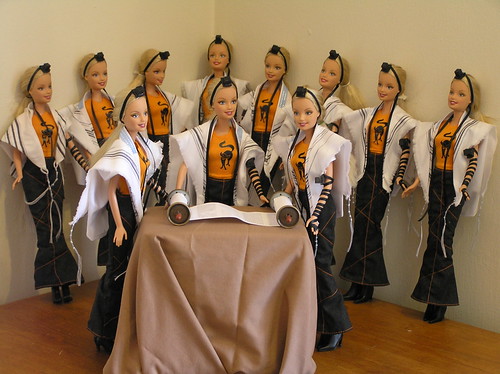 Why Israel is the world's happiest country
Why Israel is the world's happiest countryBy Spengler
Envy surrounds no country on Earth like the state of Israel, and with good reason: by objective measures, Israel is the happiest nation on Earth at the 60th anniversary of its founding. It is one of the wealthiest, freest and best-educated; and it enjoys a higher life expectancy than Germany or the Netherlands. But most remarkable is that Israelis appear to love life and hate death more than any other nation. If history is made not by rational design but by the demands of the human heart, as I argued
last week , the light heart of the Israelis in face of continuous danger is a singularity worthy of a closer look.
Can it be a coincidence that this most ancient of nations [1], and the only nation persuaded that it was summoned into history for God's service, consists of individuals who appear to love life more than any other people? As a simple index of life-preference, I plot the fertility rate versus the suicide rate of 35 industrial countries, that is, the proportion of people who choose to create new life against the proportion who choose to destroy their own. Israel stands alone, positioned in the upper-left-hand-quadrant, or life-loving, portion of the chart [2]. Those who believe in

Israel's divine election might see a special grace reflected in its love of life.
In a world given over to morbidity, the state of Israel still teaches the world love of life, not in the trivial sense of
joie de vivre, but rather as a solemn celebration of life.
In another location, I argued, "It's easy for the Jews to talk about delighting in life. They are quite sure that they are eternal, while other peoples tremble at the prospect impending extinction. It is not their individual lives that the Jews find so pleasant, but rather the notion of a covenantal life that proceeds uninterrupted through the generations." Still, it is remarkable to observe by what wide a margin the Israelis win the global happiness sweepstakes.
Nations go extinct, I have argued in the
past, because the individuals who comprise these nations choose collectively to die out. Once freedom replaces the fixed habits of traditional society, people who do not like their own lives do not trouble to have children. Not the sword of conquerors, but the indigestible sourdough of everyday life threatens the life of the nations, now dying out at a rate without precedent in recorded history.
Israel is surrounded by neighbors willing to kill themselves in order to destroy it. "As much as you love life, we love death," Muslim clerics teach; the same formula is found in a Palestinian
textbook for second graders. Apart from the fact that the Arabs are among the least free, least educated, and (apart from the oil states) poorest peoples in the world, they also are the unhappiest, even in their wealthiest kingdoms.
The contrast of Israeli happiness and Arab despondency is what makes peace an elusive goal in the region. It cannot be attributed to material conditions of life. Oil-rich Saudi Arabia ranks 171st on an international
quality of life index, below Rwanda. Israel is tied with Singapore on this index, although it should be observed that Israel ranks a runaway first on my life-preference index, whereas Singapore comes in dead last.
Even less can we blame unhappiness on experience, for no nation has suffered more than the Jews in living memory, nor has a better excuse to be miserable. Arabs did not invent suicide attacks, but they have produced a population pool willing to die in order to inflict damage greater than any in history. One cannot help but conclude that Muslim clerics do not exaggerate when they express contempt for life.
Israel's love of life, moreover, is more than an ethnic characteristic. Those who know Jewish life through the eccentric lens of Jewish-American novelists such as Saul Bellow and Philip Roth, or the films of Woody Allen, imagine the Jews to be an angst-ridden race of neurotics. Secular Jews in America are no more fertile than their Gentile peers, and by all indications quite as miserable.
For one thing, Israelis are far more religious than American Jews. Two-thirds of Israelis believe in God, although only a quarter observe their religion strictly. Even Israelis averse to religion evince a different kind of secularism than we find in the secular West. They speak the language of the Bible and undergo 12 years of Bible studies in state elementary and secondary schools.
Faith in God's enduring love for a people that believes it was summoned for his purposes out of a slave rabble must be part of the explanation. The most religious Israelis make the most babies. Ultra-Orthodox families produce nine children on average. That should be no surprise, for people of faith are more fertile than secular people, as I showed in a statistical
comparison across countries.
Traditional and modern societies have radically different population profiles, for traditional women have little choice but to spend their lives pregnant in traditional society. In the modern world, where fertility reflects choice rather than compulsion, the choice to raise children expresses love of life. The high birthrate in Arab countries still bound by tradition does not stand comparison to Israeli fertility, by far the highest in the modern world.
The faith of Israelis is unique. Jews sailed to Palestine as an act of faith, to build a state against enormous odds and in the face of hostile encirclement, joking, "You don't have to be crazy to be a Zionist, but it helps." In 1903 Theodor Herzl, the Zionist movement's secular founder, secured British support for a Jewish state in Uganda, but his movement shouted him down, for nothing short of the return to Zion of Biblical prophecy would requite it. In place of a modern language the Jewish settlers revived Hebrew, a liturgical language only since the 4th century BC, in a feat of linguistic volition without precedent. It may be that faith burns brighter in Israel because Israel was founded by a leap of faith.
Two old Jewish jokes illustrate the Israeli frame of mind.
Two elderly Jewish ladies are sitting on a park bench in St Petersburg, Florida. "Mrs Levy," asks the first, "what do you hear from your son Isaac in Detroit?" "It's just awful," Mrs Levy replies. "His wife died a year ago and left him with two little girls. Now he's lost his job as an accountant with an auto-parts company, and his health insurance will lapse in a few weeks. With the real estate market the way it is, he can't even sell his house. And the baby has come down with leukemia and needs expensive treatment. He's beside himself, and doesn't know what to do. But does he write a beautiful Hebrew letter - it's a pleasure to read."
There are layers to this joke, but the relevant one here is that bad news is softened if written in the language of the Bible, which to Jews always conveys hope.
The second joke involves the American businessman who emigrated to Israel shortly after its founding. On his arrival, he orders a telephone, and waits for weeks without a response. At length he applies in person to the telephone company, and is shown into the office of an official who explains that there is a two-year waiting list, and no way to jump the queue. "Do you mean there is no hope?," the American asks. "It is forbidden for a Jew to say there is no hope!," thunders the official. "No chance, maybe." Hope transcends probability.
If faith makes the Israelis happy, then why are the Arabs, whose observance of Islam seems so much stricter, so miserable? Islam offers its adherents not love - for Allah does not reveal Himself in love after the fashion of YHWH - but rather success. "The Islamic world cannot endure without confidence in victory, that to 'come to prayer' is the same thing as to 'come to success'. Humiliation - the perception that the
ummah cannot reward those who submit to it - is beyond its capacity to endure," I argued in another
location. Islam, or "submission", does not understand faith - trust in a loving God even when His actions appear incomprehensible - in the manner of Jews and Christians. Because the whim of Allah controls every event from the orbit of each electron to the outcome of battles, Muslims know only success or failure at each moment in time.
The military, economic and cultural failures of Islamic societies are intolerable in Muslim eyes; Jewish success is an abomination, for in the view of Muslims it is the due of the faithful, to be coveted and seized from the usurpers at the first opportunity. It is not to much of a stretch to assert that Israel's love of live, its happiness in faith, is precisely the characteristic that makes a regional peace impossible to achieve. The usurpation of the happiness that Muslims believe is due to them is sufficient cause to kill one's self in order to take happiness away from the Jewish enemy. If Israel's opponents fail to ruin Israel's happiness, there is at least a
spark of hope that they may decide to choose happiness for themselves.
Why are none of the Christian nations as happy as Israel? Few of the European nations can be termed "Christian" at all. Poland, the last European country with a high rate of attendance at Mass (at about 45%), nonetheless shows a fertility rate of only 1.27, one of Europe's lowest, and a suicide rate of 16 per 100,000. Europe's faith always wavered between adherence to Christianity as a universal religion and ethnic idolatry under a Christian veneer. European nationalism nudged Christianity to the margin during the 19th century, and the disastrous world wars of the past century left Europeans with confidence neither in Christianity nor in their own nationhood.
Only in pockets of the American population does one find birth rates comparable to Israel's, for example among evangelical Christians. There is no direct way to compare the happiness of American Christians and Israelis, but the tumultuous and Protean character of American religion is not as congenial to personal satisfaction. My suspicion is that Israel's happiness is entirely unique.
It is fashionable these days to speculate about the end of Israel, and Israel's strategic position presents scant cause for optimism, as I contended
recently. Israel's future depends on the Israelis. During 2,000 years of exile, Jews remained Jews despite forceful and often violent efforts to make them into Christians or Muslims. One has to suppose that they did not abandon Judaism because they liked being Jewish. With utmost sincerity, the Jews prayed thrice daily, "It is our duty to praise the Master of all, to acclaim the greatness of the One who forms all creation, for God did not make us like the nations of other lands, and did not make us the same as other families of the Earth. God did not place us in the same situations as others, and our destiny is not the same as anyone else's."
If the Israelis are the happiest country on Earth, as the numbers indicate, it seems possible that they will do what is required to keep their country, despite the odds against them. I do not know whether they will succeed. If Israel fails, however, the rest of the world will lose a unique gauge of the human capacity for happiness as well as faith. I cannot conceive of a sadder event.





























 Israel's divine election might see a special grace reflected in its love of life.
Israel's divine election might see a special grace reflected in its love of life.


